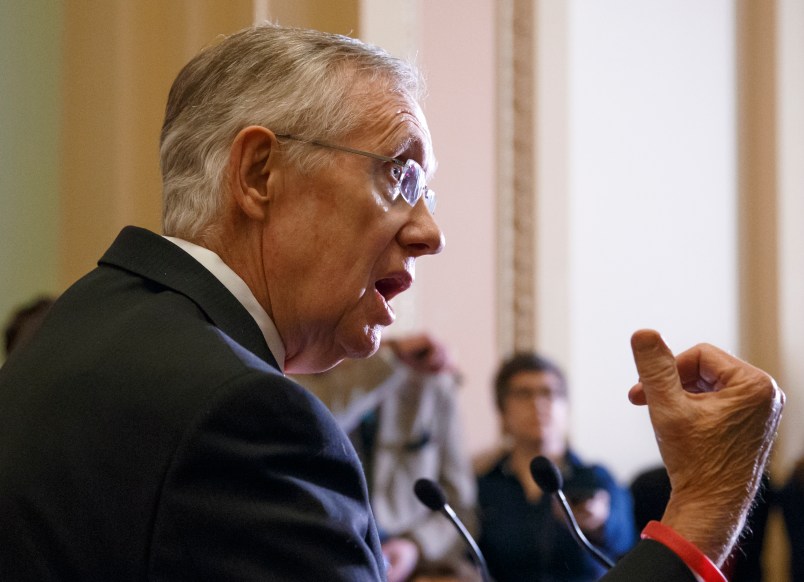When Harry Reid was growing up, he got a job working at a service station. He wanted to buy his mom teeth.
She’d been hit with a softball in the face as a young woman, and her oral health hadn’t been the same for decades. He saved up his money and called it one of his life’s greatest accomplishments.
On the floor of the U.S. Senate Thursday it was one of dozens of stories Harry Reid—the onetime majority leader and now minority leader—shared as he said goodbye to an institution he’s irrevocably helped shape over the last three decades.
It’s such a trope in Washington these days that it barely needs to be said, but Reid, 77, grew up in the dusty town of Searchlight, Nevada, where he hitchhiked to school and took up baseball—a passion that he still has. His mom took odd jobs washing and ironing to make ends meet. His father was a hard rock miner who committed suicide when Reid was 32. All of it—the sweet, the bitter, the exhilarating—shaped him and Reid didn’t gloss over any of the details Thursday.
“I became Harry Reid, the guy from Searchlight,” said Reid, who did not seek re-election this year.
It was Reid’s upbringing that influenced his progressive politics and made him a fierce defender of social programs like the Affordable Care Act, which Republicans are looking to repeal in January when Reid will no longer be in office.
“It would have been wonderful if we had had something like that around to help my family when we were growing up,” Reid said, noting that his mother once had been falsely diagnosed with tuberculosis and even then didn’t see a doctor.
Reid chronicled his upbringing as well as the dozens of pieces of legislation that defined his career, like the Taxpayers Bill of Rights and Congressional Review Act, which actually gave Congress more ability to stop Presidents from passing burdensome regulations.
“It was great when we had Republican presidents, not so great when we had Democratic presidents, but it was fair,” Reid said.
He spoke candidly about his quest to diversify the Senate and federal courts, his efforts to built veterans hospitals in Southern Nevada and his life-long pursuit to study and understand suicide.
“Just like I had trouble coming to grips with my home in Searchlight, I had trouble coming to grips with the fact that my dad killed himself,” Reid said.
Core to his farewell Thursday was his wife Landra and his five children who sat in the gallery watching the speech.
In recent years, Reid has taken on the role of progressive defender from the Senate floor, playing an outsized role in criticizing Republican presidential candidates like Mitt Romney and Donald Trump.
His other top target has been Majority Leader Mitch McConnell (R-KY), with whom he has shared an acrimonious relationship. On Thursday, Reid tried to set the record straight on that.
“It was over with. We’re friends. We were there each doing our thing, to effect our cause. That’s what we do here. McConnell and Reid don’t need to be hugging out here every day,” Reid said. “That isn’t want we do. We’re advocates for our cause. I do the very best I can. He does the best he can. And he laid that out just fine a few minutes ago so this is not a love session for Reid and McConnell. Although I want everyone to know here Mitch McConnell is my friend.”
Reid’s speech ran more than an hour as he recounted his favorite members with who he served, including Senate Minority Whip Dick Durbin (D-IL), and his staff. He estimated he’d had 3,000 people work for him in his career. But the speech ended just like many of Reid’s phone calls and conversations do, abruptly.
“I wish everyone the best,” he said. “I’m sorry I talked so long.”







We’re going to miss Harry.
Thanks, Harry.
We really could have used one more SC Justice, though.
This just in…
And you thought it couldn’t get worse
HOLY. FUCK.
Your poor Trump Rubes
Working man’s hero indeed
You got scammed
No there are no do-overs and no you don’t get yor money back
Trump’s Likely Labor Pick, Andrew Puzder, Is Critic of Minimum Wage Increases
Harry, over the years I haven’t always agreed with your message or your method but you have always been an outspoken critic of the unfair and unjust, and an advocate for the least among us.
We’re really going to miss you, Sir, and I thank you for the years you’ve given us all!
@sickneffintired - who could have possibly imagined that a wealthy fast food mogul would take issue with the minimum wage. What next? Concerns over overtime rules? A fry cook can’t be changed to a salaried employee?
Good luck, Trumpeteers!
Trump: “Losers!”